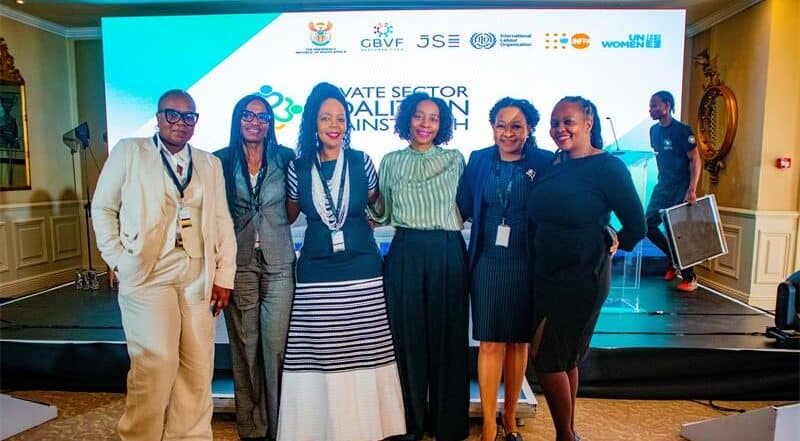The formation of the Private Sector Coalition Against Gender-Based Violence and Harassment (PSC) has taken a significant step in the fight against gender-based violence and harassment (GBVH) in the workplace. This initiative was launched at a Private Sector Symposium in Johannesburg, bringing together key players such as the GBVF Response Fund, the Presidency, the International Labour Organisation (ILO), the United Nations Population Fund (UNFPA), UN Women, and the Johannesburg Stock Exchange (JSE).
Read more: JSE Investment Challenge is open for registration
Several CEOs and senior leaders across various industries attended the symposium. They expressed their support for the PSC, including Sitho Mdlalose, CEO of Vodacom South Africa; Nolitha Fakude, chairman of Anglo American’s management board in South Africa; Shirley Machaba, CEO of PwC South Africa; and SPAR Group’s sustainability executive, Kevin O’Brien.
Vuyo Lee, director of marketing and corporate affairs at the JSE, explained that GBVH in the workplace not only affects individuals but also hinders South Africa’s growth, with severe economic impacts such as lost productivity and increased absenteeism. “It is essential for businesses to play their part in curbing this scourge in the workplace,” she said.
The creation of the PSC follows the Second Presidential Summit on GBVF in November 2022, where a greater private sector role was called for. According to a 2014 KPMG report, GBVH imposes vast economic costs, including healthcare, loss of earnings, and reduced productivity. This national initiative aims to impact over 11 million employees across South Africa.
Sazini Mojapelo, CEO of the GBVF Response Fund, stated that companies are increasingly recognising the need to address GBVH. “Addressing GBVH in the workplace is both a moral and business imperative,” she said. “The consequences extend far beyond the workplace, affecting families and communities. We want to work with the private sector to solve this problem.”
Also read: EFF threatens to shut JSE down
The United Nations, through its various agencies such as the ILO, UNFPA, and UN Women, expressed strong support for the PSC. UN resident coordinator Nelson Muffuh shared that the UN has seen the transformative effects of partnerships like this globally and believes similar success can be achieved in South Africa.
Mojapelo emphasised that failure to address GBVH leads to lower employee morale, increased absenteeism, and heightened legal and reputational risks. “This reality should spur the private sector to take immediate, constructive action,” she urged.
The PSC will help businesses develop standards and best practices to prevent and address GBVH. It encourages companies to adopt a three-step framework supported by ILO C190 and UN Women, which includes prevention, protection, and enforcement. This approach is designed to create a ‘zero- tolerance’ culture and foster safer workplaces.
The PSC provides a collaborative platform for companies to tackle gender inequality and workplace violence, with a focus on addressing toxic masculinity and patriarchy. Mojapelo concluded that until women are safe at work and home, and their contributions are valued, South Africa cannot prosper as a nation.
For companies interested in joining the PSC and aligning with its initiatives, there is no financial obligation – only a commitment to adopting the three-step framework to create positive change in the workplace.
Related article: And the Best of Joburg winners are
At Caxton, we employ humans to generate daily fresh news, not AI intervention. Happy reading!
This article was originally published by a www.citizen.co.za . Read the Original article here. .


